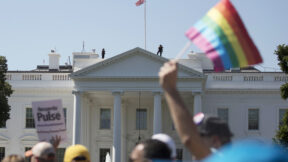White House Reporters Push Biden Spox Jean-Pierre To Explain How ‘Religious Protections’ in Marriage Law Don’t Codify Discrimination
Several reporters asked White House Press Secretary Karine Jean-Pierre to explain how “religious protections” in the Respect For Marriage Act don’t amount to “codifying discrimination.”
President Joe Biden signed the Respect for Marriage Act into law Tuesday afternoon, codifying federal protections for same-sex and interracial marriages.
But at Tuesday’s press briefing, just before that signing ceremony, reporters pointed out some of the weaknesses in those protections. CBS News Radio White House Correspondent Steve Portnoy was first to ask questions about the provisions, which KJP answered at length:
MR. PORTNOY: Thanks, Karine. The President (inaudible) about to enact a landmark piece of civil rights legislation, but I was hoping you could speak to the concerns that some have expressed that what’s actually in the bill could be read as something that codifies discrimination. There’s a section here that speaks to the ability of nonprofit religious organizations, faith-based social agencies, educational institutions, employees of those organizations to deny services, accommodations, facilities, goods, advantages, privileges to gay couples. So how is that not codifying discrimination?
MS. JEAN-PIERRE: So, a couple of things. Let’s — let’s walk through what’s in the piece of legislation that the President is signing in a few minutes. It codifies federal recognition of same-sex marriages. That matters. Technically, the Defense of Marriage Act from the 1990s was still on the books but essentially dormant because of the Obergefell decision. This repeals DOMA and ensures federal recognition of same-sex marriages. It requires states to recognize same-sex and interra- — interracial marriages performed in other states. I.e. if Obergefell or Loving falls and you get married — married in Massachusetts, Alabama still has to honor the marriage. Meaning, if your husband, wife gets sick, an Alabama hospital would still be required to let you see them. That matters for so many millions of American across the country.
I know there’s questions about religious liberty. And so we believe that — you know, we believe that the RFMA contains strong protections for houses of worship and religious nonprofits. And this question was well litigated throughout the legislative process where it passed with both chambers of bipartisan support. And I think that matters, right? Bicameral, bipartisan support was had for this piece of legislation.
And so, look, as the President said 10 years ago, as I mentioned, it comes down to a fundamental question of who would you love — who do you love and will you be loyal to that person.
This law ensures that it — it realized for all person. And that’s why so many faith leaders and religious traditions have advocated in support for this bill. So it has gotten support in a bipartisan way across the country, in Congress, during this time — right? — where — you know, where people say we can’t get things done. Here, we have this piece of legislation that has gotten bipartisan support.
Later in the briefing, Brian Karem followed up:
MR. KAREM: Karine, thanks. Just to follow up on what Steve asked, we understand how the legislation was framed and will be signed by the President. Do you anticipate that this administration will go back or that the Democrats will go back and try to clean up the language in the legislation so it does not codify discrimination?
MS. JEAN-PIERRE: Look, what we’re saying to you today is that this — this piece of legislation was done in a bipartisan, bicameral way, and it will make a difference for millions of Americans across the country. And we’re going to celebrate this moment. We are going to celebrate the activists and the families who have worked very hard the last couple of decades to make this happen. And that is what hap- — and that is what’s important and that’s what you’re going to hear from this President today.
Is there more work to do? Absolutely. There’s always more work to do. And you’ll hear directly from the President. I’m certainly not going to get ahead of him at this time. But, again, this is an important moment, a historic moment that we — that we should not forget what it means to many, many millions of Americans across the country.
MR. KAREM: And then quickly, to follow up on that. So he’ll sign that today, and you say there’s more work to do. Or is he endorsing additional work to try and change language?
MS. JEAN-PIERRE: I don’t — I don’t have anything to preview from here.
As I said, there are extreme — extreme conservatives who are going to continue to attack this, who are — want to take away fundamental rights. We saw what happened just in June with the Dobbs decision. And so we take — you should take that very, very seriously.
But, again, this is an important day, and we are going to celebrate this day with thousands of people who will be standing or sitting in the South — on the South Lawn and hearing from Cyndi Lauper and the President and the First Lady and the Vice President. It’s a really — it’s a really good — it’s a really good day. It’s a very good day.
On Monday, Jean-Pierre faced questions from EWTN White House correspondent Owen Jensen who suggested that protecting marriage equality will result in “discrimination” against religious organizations.
Watch above via The White House.





Comments
↓ Scroll down for comments ↓